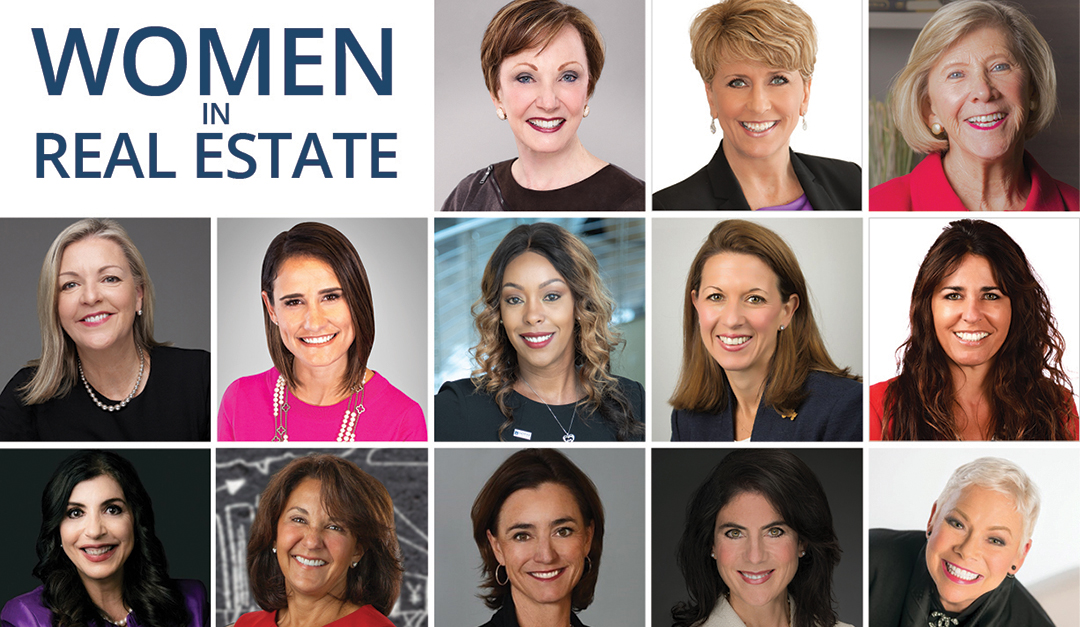Understanding the Hurdles, Seizing the Opportunities
This article first appeared in Real Estate magazine’s special-edition Women in Real Estate issue. View the entire issue here.
In a field long dominated by women at the sales level, leadership opportunities have often lagged behind for women in real estate. And for the increasing number of women who have assumed top roles in the business, the journey has meant overcoming unique hurdles, but has also yielded rich rewards. In this special Women in Real Estate roundtable discussion, some of real estate’s most successful female leaders candidly share their experiences of rising through the ranks, offer their unique perspectives on the current state of the industry, and provide indispensable advice for future leaders.
Participants:
Candace Adams, President and CEO, Berkshire Hathaway HomeServices New England, New York & Westchester Properties
Mary Lee Blaylock, President and CEO, Berkshire Hathaway HomeServices California Properties
Kendall Bonner, Broker/Owner, RE/MAX Capital Realty
Sherry Chris, President and CEO, Expansion Brands Portfolio, Realogy Holdings Corp.
Regina Coia, President, Berkshire Hathaway HomeServices Homesale Realty
Marilyn Eiland, Managing Partner, Better Homes and Gardens Real Estate Gary Greene
Michele Harrington, Chief Operating Officer, First Team Real Estate
Whitney Finn LaCosta, General Manager, Coach REALTORS®
Christina Pappas, Vice President, The Keyes Family of Companies
Teresa Palacios Smith, Chief Diversity, Equity & Inclusion Officer, HomeServices of America and HSF Affiliates
Diane Ramirez, Executive Chairman and Senior Advisor, Brown Harris Stevens
Robin S. Sheakley, President, Sibcy Cline REALTORS®
Mary Lynn Stone, President, Century 21 New Millennium
How would you describe opportunities for women in the real estate business when you first started as compared to now?
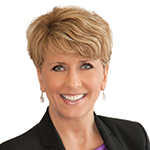 Mary Lee Blaylock: Compared to today, it was an anomaly to have a woman at the top. Now it is celebrated more than ever. Celebrated, due in part to the individual who has achieved that success in the C-Suite, but also because the journey was surely different than that of male counterparts. The opportunities for women today are real when hard work is applied and the job is earned. When I started, it was feasible, but often only recognized as “real” by myself, the individual. As I reflect on that time, I realize I often had to do the work of a higher-level employee for a longer period of time than my male counterparts before being recognized as capable of doing the job. Business acumen doesn’t discern between men and women. Either you have it, or you don’t.
Mary Lee Blaylock: Compared to today, it was an anomaly to have a woman at the top. Now it is celebrated more than ever. Celebrated, due in part to the individual who has achieved that success in the C-Suite, but also because the journey was surely different than that of male counterparts. The opportunities for women today are real when hard work is applied and the job is earned. When I started, it was feasible, but often only recognized as “real” by myself, the individual. As I reflect on that time, I realize I often had to do the work of a higher-level employee for a longer period of time than my male counterparts before being recognized as capable of doing the job. Business acumen doesn’t discern between men and women. Either you have it, or you don’t.
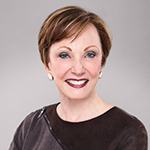 Diane Ramirez: Residential real estate has actually been a good career prospect, historically speaking, for women. Back in the 1970s and ’80s, when more women were homemakers, real estate allowed them the freedom to create flexible hours around childcare, school drop-offs, etc. Of course, back then, it was more of a part-time job than a full-fledged career path. Today, with the advent of new technology and industry disruptors and aggregators, the role of a real estate agent has become increasingly more important. I think the residential real estate industry has been one of the great equalizers in the job force because you get out of it what you put into it—regardless of gender!
Diane Ramirez: Residential real estate has actually been a good career prospect, historically speaking, for women. Back in the 1970s and ’80s, when more women were homemakers, real estate allowed them the freedom to create flexible hours around childcare, school drop-offs, etc. Of course, back then, it was more of a part-time job than a full-fledged career path. Today, with the advent of new technology and industry disruptors and aggregators, the role of a real estate agent has become increasingly more important. I think the residential real estate industry has been one of the great equalizers in the job force because you get out of it what you put into it—regardless of gender!
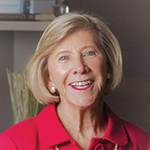 Marilyn Eiland: When I started, very few men were showing houses. They all aspired to being the manager or owner. When the broker needed a manager, they would choose a guy, even if there were women more experienced and knowledgeable in the office. In the early 1980s, I recall a broker explaining to me that “women don’t like to work for women.” Today at my company, there are many capable and well-respected female leaders.
Marilyn Eiland: When I started, very few men were showing houses. They all aspired to being the manager or owner. When the broker needed a manager, they would choose a guy, even if there were women more experienced and knowledgeable in the office. In the early 1980s, I recall a broker explaining to me that “women don’t like to work for women.” Today at my company, there are many capable and well-respected female leaders.
In your opinion, why is it that the industry is predominantly female at the REALTOR® level, yet still heavily male at the leadership level?
 Candace Adams: It amazes me that there is still such an imbalance. Although there have been some great success stories, including mine, where a male mentor provided great support and opportunity, I am quite certain that it isn’t prevalent. Men are comfortable being mentors to men, and men are comfortable being mentored by men. Men are less likely to feel a comfort level mentoring future women leaders, and women may not have the confidence to step up and push through the obstacles, which still exist. It is ultimately going to be up to women leaders to bring other women along through mentorship.
Candace Adams: It amazes me that there is still such an imbalance. Although there have been some great success stories, including mine, where a male mentor provided great support and opportunity, I am quite certain that it isn’t prevalent. Men are comfortable being mentors to men, and men are comfortable being mentored by men. Men are less likely to feel a comfort level mentoring future women leaders, and women may not have the confidence to step up and push through the obstacles, which still exist. It is ultimately going to be up to women leaders to bring other women along through mentorship.
 Mary Lynn Stone: To a great extent, women dominate real estate sales positions and men outnumber women in the overall business-development side of the industry. Unlike some other industries, I believe it is somewhat tough to say that real estate has a “glass ceiling.” What is different in real estate is that because agents are independent contractors, they are everyday leaders in their own business. They very much lead and call the shots. In general, on a pay level, real estate agents who put their time in, build a knowledge-base and gain experience are satisfied and rewarded with the income possibilities…and also not encumbered by a corporate structure. I believe that many women are actually not interested in management and leadership positions that add a significant layer of responsibility that takes away their flexibility and slows their financial growth tract.
Mary Lynn Stone: To a great extent, women dominate real estate sales positions and men outnumber women in the overall business-development side of the industry. Unlike some other industries, I believe it is somewhat tough to say that real estate has a “glass ceiling.” What is different in real estate is that because agents are independent contractors, they are everyday leaders in their own business. They very much lead and call the shots. In general, on a pay level, real estate agents who put their time in, build a knowledge-base and gain experience are satisfied and rewarded with the income possibilities…and also not encumbered by a corporate structure. I believe that many women are actually not interested in management and leadership positions that add a significant layer of responsibility that takes away their flexibility and slows their financial growth tract.
Mary Lee Blaylock: It is beginning to change overall. Females make incredibly successful agents. It provides for a level of flexibility that women desire in their pursuit to balance home, family and work life. The natural empathy that women have blends nicely and naturally with the, oftentimes, emotional process of selling or buying a home. I am certain, over time, more women will aspire to become leaders of business in our industry, and I look forward to watching and actively participating in the expansion of women at the top in real estate. Maybe even mentoring and guiding to help encourage other women to see themselves in those positions.
 Christina Pappas: Having women in leadership in the brokerage can bring many advantages. Women often bring empathy, vulnerability and a high-level engagement to any job. Women are able to build rapport with coworkers and agents through their openness and transparency. Many of our women who are mothers don’t just turn off motherhood at the office, which means they have plenty of patience, tend to be able to rationalize and deal with heated situations, and connect with agents on a unique level. Women have been wearing many hats for many years, and now, they are doing that at some of our best real estate companies. Their talents are interchangeable whether at home or work.
Christina Pappas: Having women in leadership in the brokerage can bring many advantages. Women often bring empathy, vulnerability and a high-level engagement to any job. Women are able to build rapport with coworkers and agents through their openness and transparency. Many of our women who are mothers don’t just turn off motherhood at the office, which means they have plenty of patience, tend to be able to rationalize and deal with heated situations, and connect with agents on a unique level. Women have been wearing many hats for many years, and now, they are doing that at some of our best real estate companies. Their talents are interchangeable whether at home or work.
What are some of the biggest hurdles you’ve overcome as a female leader in this business?
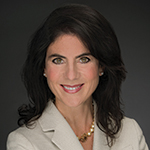 Regina Coia: While I was very fortunate to have garnered respect from the people who really mattered throughout my career, there have been situations when I faced condescension by both men and women. Very early in my career, some cast judgement and assumed that I did not properly earn my position until they saw the results of my work come to fruition. These types of situations along the way only served to galvanize my resolve to be a better leader and role model for others. From the outset of my career 34 years ago, I always entered a situation with confidence, despite whatever emotions I was experiencing. I knew that I would be an asset to the company because I was willing to learn and work harder than anyone to be successful—and, more importantly, to make a difference.
Regina Coia: While I was very fortunate to have garnered respect from the people who really mattered throughout my career, there have been situations when I faced condescension by both men and women. Very early in my career, some cast judgement and assumed that I did not properly earn my position until they saw the results of my work come to fruition. These types of situations along the way only served to galvanize my resolve to be a better leader and role model for others. From the outset of my career 34 years ago, I always entered a situation with confidence, despite whatever emotions I was experiencing. I knew that I would be an asset to the company because I was willing to learn and work harder than anyone to be successful—and, more importantly, to make a difference.
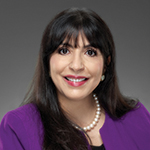 Teresa Palacios Smith: Most hurdles are self-imposed. As female leaders, I believe we often wonder if we are truly worthy of the opportunities being presented. We typically look at our weaknesses versus our own strengths. Conversely, my sense is that most men are not as self-critical. Perhaps like many other women, I too at times struggled with the insecurity of self-doubt and fear of failure. Such self-limiting thoughts can hold women back from moving forward, especially when thinking that anything less than perfection represents inadequacies. This realization has led me to believe that the effort we can control is a more important goal than ultimate result.
Teresa Palacios Smith: Most hurdles are self-imposed. As female leaders, I believe we often wonder if we are truly worthy of the opportunities being presented. We typically look at our weaknesses versus our own strengths. Conversely, my sense is that most men are not as self-critical. Perhaps like many other women, I too at times struggled with the insecurity of self-doubt and fear of failure. Such self-limiting thoughts can hold women back from moving forward, especially when thinking that anything less than perfection represents inadequacies. This realization has led me to believe that the effort we can control is a more important goal than ultimate result.
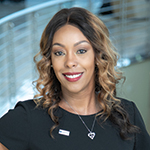 Kendall Bonner: I completely agree. I think the biggest hurdle I have faced is my own self-doubt and limiting beliefs. There have been so many times where I questioned my successes, my goals, my dreams. In the past, I sometimes have felt “not good enough” or “I’m not there yet” or “I’ll never be able to do that.” Mindset has been the greatest challenge by far, but I’ve come a long way. I now feel very clear on who I am, what I want and my purpose in my business. I have also learned that if I want to do or learn something, I can do or learn anything!
Kendall Bonner: I completely agree. I think the biggest hurdle I have faced is my own self-doubt and limiting beliefs. There have been so many times where I questioned my successes, my goals, my dreams. In the past, I sometimes have felt “not good enough” or “I’m not there yet” or “I’ll never be able to do that.” Mindset has been the greatest challenge by far, but I’ve come a long way. I now feel very clear on who I am, what I want and my purpose in my business. I have also learned that if I want to do or learn something, I can do or learn anything!
Christina Pappas: At the beginning of 2020, I had my first child, which led to new obstacles, including work/family balance and deciding how our daughter would be raised with two working parents. The silver lining was that after my two months of maternity leave, I went back to work only to be sent to work from home during the stay-at-home orders. This allowed so much more time with my daughter than I could have ever imagined. I know that going into 2021, I will be faced with the new obstacle of deciding how much time I want to spend at home, traveling or in new endeavors. As women, I think we are constantly battling with the realization that when we say “yes” to business and additional responsibilities at work, we say “no” to our families and children. I just know that I am at my best when I am fulfilled, and that is balancing me as a mother, daughter, coworker, wife and leader.
 Whitney Finn LaCosta: Yes, I agree with that. The many hats we wear are the biggest hurdle. Women leaders often have the extra burden of juggling the responsibilities of family that our male counterparts might not have. To be successful, I have learned that time management and delegation are essential. I have to become comfortable with not everything being perfect!
Whitney Finn LaCosta: Yes, I agree with that. The many hats we wear are the biggest hurdle. Women leaders often have the extra burden of juggling the responsibilities of family that our male counterparts might not have. To be successful, I have learned that time management and delegation are essential. I have to become comfortable with not everything being perfect!
What are some of the unique advantages women can offer as real estate leaders?
Teresa Palacios Smith: It was a cartoonist who wrote the following caption about dancing legends of decades past, Ginger Rogers and Fred Astaire: “Sure, Fred Astaire was great, but don’t forget Ginger Rogers did everything he did…backwards and in high heels.” Women have the unique advantage of being able to multitask, be problem solvers, network and collaborate with others, along with combining emotional intelligence with business acumen. Women are also noted, without ego or self-interest, for jumping in and doing whatever it takes to ensure that a task is either completed or resolved. I also believe that women lead with compassion and heart and aren’t afraid to reach out just to check in on the emotional state of their colleagues and coworkers.
Kendall Bonner: Our unique advantages include empathy, grit, mastery and focus. So many of these skills are tested and battle-proven at home, as moms and wives and caretakers, as well as in the workplace. In fact, those are required traits to succeed both at home and at work. So many of us have a natural instinct and desire to problem-solve. That’s what leaders do!
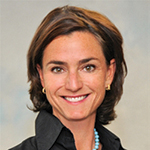 Robin S. Sheakley: I have always said that as a REALTOR®, our professional life is everyone else’s personal life. Women tend to be more empathetic and have an easier time leading with this dual approach and achieving consensus.
Robin S. Sheakley: I have always said that as a REALTOR®, our professional life is everyone else’s personal life. Women tend to be more empathetic and have an easier time leading with this dual approach and achieving consensus.
Whitney Finn LaCosta: Women are naturally intuitive and nurturing, and I think these inherent traits serve them well in our business, which is mainly a people and interrelationship business. There are so many amazing women leaders in our industry that one does not have to look hard to find an excellent role model and mentor to turn to for guidance.
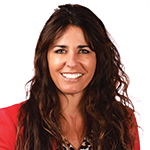 Michele Harrington: We are an industry dominated by women, and as long as women demand and deserve respect, we will get it. I came into First Team the only female to hold this position in the 45-year company history, and I have to say, the feedback from our managers, our staff and our agents is that I have been a breath of fresh air. Why? Because I listen, inspire, collaborate and empathize, and I never let my ego get in the way. Listening is a skill most men just aren’t as good at, and ego…don’t get me started! Women leaders have all kinds of advantages, but if we always believe in the misconceptions that it’s too hard to compete as a woman or we are somehow victims of society, then we will never rise to give our agents the leadership they deserve.
Michele Harrington: We are an industry dominated by women, and as long as women demand and deserve respect, we will get it. I came into First Team the only female to hold this position in the 45-year company history, and I have to say, the feedback from our managers, our staff and our agents is that I have been a breath of fresh air. Why? Because I listen, inspire, collaborate and empathize, and I never let my ego get in the way. Listening is a skill most men just aren’t as good at, and ego…don’t get me started! Women leaders have all kinds of advantages, but if we always believe in the misconceptions that it’s too hard to compete as a woman or we are somehow victims of society, then we will never rise to give our agents the leadership they deserve.
How have you sought to “pay it forward” so to speak, and pave the way for future female leaders?
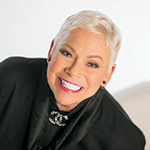 Sherry Chris: I have for many years mentored young women either entering the business or entering the leadership aspect of the business. For me, my first leadership role was at the age of 27, back in the late 1980s—I was and always will be grateful for the mentorship and guidance I received back then and will always be available to pay it forward. In many respects, I was one of the pioneers who led the way. One of my principles is that it is important as an emerging female leader not to segregate yourself as a female leader, but to celebrate your success as a leader.
Sherry Chris: I have for many years mentored young women either entering the business or entering the leadership aspect of the business. For me, my first leadership role was at the age of 27, back in the late 1980s—I was and always will be grateful for the mentorship and guidance I received back then and will always be available to pay it forward. In many respects, I was one of the pioneers who led the way. One of my principles is that it is important as an emerging female leader not to segregate yourself as a female leader, but to celebrate your success as a leader.
Mary Lynn Stone: I am truly blessed to be able to, with my business partners, create opportunities for women and men to achieve their financial dreams. I try hard to pay it forward to women wanting to create something of their own. I know their commitments and need for flexibility, and I do whatever I can to nurture their many talents. These talents may be totally different than those of men, and that’s good—there is no need to try and compete in the same way. I try to give other women the confidence to succeed in “their way.” Everyone has their own “why.” I want to know about them and allow them to find their way to succeed. And they are succeeding. I see it every day.
Candace Adams: My greatest joy in mentoring women is to empower them and watch them evolve with a high level of confidence to truly tap into their strongest talents. Taking away barriers, listening to their ideas and stretching them to grow in their careers without ridicule and judgement allows women to thrive and truly bring out their best. It is the most fulfilling part of leadership for me.
What are your biggest concerns about the real estate market right now?
Mary Lynn Stone: We have seen up-markets and down-markets. Each has had its challenges to navigate. Now, for the first time, we are experiencing a pandemic market with the added disruption of political unrest, very unfortunately, associated with violence and destruction. All this has brought a rapid change in people’s migration patterns and an unprepared real estate market. Already experiencing an all-time shortage in inventory, these eight months of change have exacerbated the low-inventory situation. For the moment and foreseeable year or so, people are daring to move away from the congested business areas, embracing telecommuting and also realizing price and value in outlying areas. This pressure on inventory has many homes selling extremely fast and is driving competitive bids on properties, which is likely causing many buyers to pay a premium.
Mary Lee Blaylock: I don’t have any real concerns about the market, (but) what does bother me are the myriad entrants into the industry simply trying to gain a buck rather than focusing on the clients and how to provide them with the most exceptional service. Our industry is often pursued because of the perception that it can provide a quick financial fix, and when that focus becomes the driver of activities, it takes away from those of us who are fighting for the consumers and keeping integrity in place.
Sherry Chris: One of the great opportunities I see today in the real estate market is to find ways to surprise and delight the end consumer and provide exceptional customer service. That will anchor our relevance for years to come as we grapple with the balance of online real estate versus face-to-face.
What are you doing to innovate and stay creative in the year ahead?
Kendall Bonner: I created a no-code app for real estate agents to track their daily prospecting habits, goals and conversion rates. I’m sure others have come before me, but my goal was to create something free that agents can use on a daily basis to ensure their goals show up. I truly believe “What gets measured gets done. What gets measured gets improved.”
Robin S. Sheakley: We are focusing on connectivity through personal relationships, technology and direct marketing. Staying present and focused on the communities we serve is our priority.
Marilyn Eiland: Our new technology platform, IMPACT, provides agents with a single point of entry to their CRM, to all marketing and requests for customization, to transaction management and our intranet, which includes a library of our training videos, forms, manuals and more. We have also coached our agents on the art of the video and the power of a well-done virtual home tour. Managers work with agents on videos they can post about market stats or small business owners in the area, as well as tips on home decorating or maintenance, which ties in well with our Better Homes and Gardens brand.
Teresa Palacios Smith: We launched a Facebook Live series entitled “Women Who Lead,” which has been a huge success and one of the most satisfying events of which I am involved. The series airs twice a month during Facebook’s “Women Crush Wednesdays.” This year, I will expand it to include diversity topics and feature diversity and equity business leaders.
Diane Ramirez: We are investing in new technologies for our agents; one of them is called MAIA. It’s an incredibly useful internal platform built in partnership with Salesforce that allows agents to streamline their marketing and communications tools all in one place. We are also launching a home staging program that allows homeowners to make cosmetic and renovation upgrades before listing their properties through an approved list of qualified vendors with no upfront, out-of-pocket costs and no interest. Essentially, we want to provide our agents with the tools to really succeed—for their benefit, and for the benefit of their clients.
What do you believe the industry needs to do to tackle diversity issues for a better future?
Teresa Palacios Smith: No. 1, it begins with awareness and acknowledgment. Diversity is 360—you need to look at yourself, your leadership and your company, and tackle it square on. Similarity biases are prevalent in our industry, and as leaders, we need to start looking at our own “house” and determine if this is where we need to start.
No. 2, the industry needs to invest and support leadership training and programs that provide tools to diverse candidates who can then move into leadership opportunities within the real estate industry. No. 3, we need to support and encourage legislation and programs that create opportunities for underserved markets.
And finally, it is important that we provide more in-depth education and training to the REALTOR® community, beginning at the local level by ensuring that agents are receiving effective Fair Housing training and ethics courses as a requirement when renewing their license. Training on unconscious and implicit bias should be offered to agents at both the local and state level so that they are aware of the important role this plays when working with buyers and sellers. Additional education around Fair Housing and the law should be communicated to agents and the community so that there is a constant and elevated awareness.
Kendall Bonner: Diversity is so important. Diversity fuels creativity and innovation because everyone is coming to the table with different ideas, different perspectives and different stories. It starts with open conversation and listening with empathy. I think it also requires intention to change by everyone, as well as intention to see! If you are not willing to see and acknowledge the problem, we will never expose the solution.
Regina Coia: This initiative has already begun with the National Association of REALTORS®’ groundbreaking changes to the Code of Ethics. This has obviously been quite a hotly debated course of action; however, there could not be a more clear answer to this question than the efforts of America’s largest trade organization, despite such controversy. From there, it is all about local leaders coaching their agents and staff with the expectation that they will align with the essential tenet of simply doing the right thing.
Andrew King is a contributing editor to RISMedia.



